Urban Surf 4 Kids- Foster Youth (October 2019)
February 1, 2021
/
Issue Three- January 2020:
By Mercedes Barreto

Libby Donalson, an active member of the board of members in the Urban Surf 4 Kids non-profit organization, tells her story about the experiences behind some very grateful foster youth, who confirm that Urban Surf 4 Kids is an understanding place where they have grown and, overall, a family has grown with them.
When did you first become affiliated with the Urban Surf 4 Kids organization? How did this help your situation?
“My family first became affiliated with Urban Surf 4 Kids in June of 2015. We were placed with a sibling set of four foster youth a few weeks before our first surf camp, and we were looking for new ways to help them through their trauma. Urban Surf 4 Kids has given us that and so much more. They are a community that we can turn to in times of excitement and hardship. They also provide a safe space for our children to learn new and empowering skills, and work through the healing process through surf therapy.”
Could you describe your situation, now and before, in a simple paragraph or two?
“Before Urban Surf our family often felt very isolated. We only knew a handful of other foster families, and it can be really difficult to connect with “normal” families because the dynamic can be so different.
There were very few people in our lives who really understood things like why our 12-year-old daughter was still having violent temper tantrums, and how to address them. Furthermore, there were very few people we could turn to for advice. While therapists are great and we deeply appreciate any advice they have, it is different than actually raising the child, so they can only help so much. This isolation was even more prominent for our foster youth. They had very few peers who could understand the trauma they had experienced, and there were even times when they were bullied for being foster children (especially the younger kids) because other children didn’t understand. Additionally, they often had very few things that really made them feel proud.
Now, after joining US4k, we have a community we can turn to.
Not only do we as foster parents have others we can turn to for advice and reassurance, but our foster youth have a place where they can connect to others who have similar stories. Additionally, they can feel empowered through surf therapy. Surf therapy allows them to feel the calming and healing properties of the ocean, as well as give the child a sense of confidence and accomplishment, which many foster youths severely lack.”
What got you through your day in the situation before? And your situation as of now? What is your driving force?
“Our driving force has always been to help as much foster youth as we can and give them a safe space where they can feel welcome. However, our ability to do so while not feeling discouraged has significantly increased since joining Urban Surf. We have always leaned on each other as a family, but with so many people from very different backgrounds there can be some strain at times; it was much harder to remember our driving force and use it to get through the day. Now, we have others we can turn to which helps alleviate some of that strain, and with so many amazing children in our lives, it is difficult to forget why we do this.”
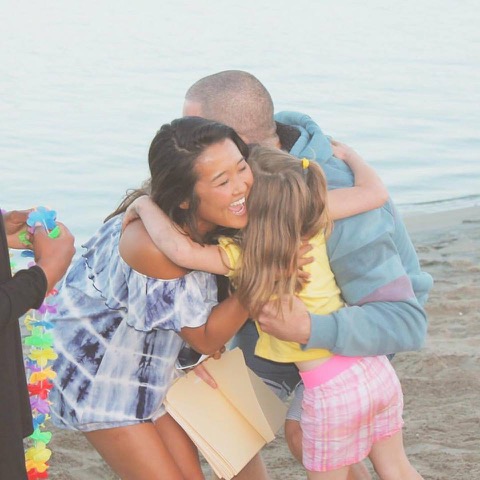
In regards to the children you foster, could you tell me more about them and their struggles? Their stories?
“Most of our kids have faced substance abuse and extreme neglect, several have faced severe physical abuse, and have faced sexual abuse. Two of the largest themes I have seen throughout all of my foster children have been a sense of isolation and loss of self. All of them have also dealt with one or more mental disorders. I included a few individual stories to help you get a personalized understanding of how Urban Surf has played a role in the lives of our youth:
Serena* (age 16) – Urban Surf 4 Kids has had arguably had the largest effect on Serena out of all of our children. Serena moved to the United States from Vietnam at the age of 7 speaking little to no English and suffering from an auditory processing disorder. She was also sexually abused by her father for years while her mother turned a blind eye. For nearly her entire life, Serena has felt very isolated and alone.
This is why Urban Surf was so instrumental in her healing process. Urban Surf was the first place she went where she could connect with other kids on a level she never could before. She bonded very quickly with one girl in particular who she now looks at as an older sister, and will often reach out to her when she is struggling with her past. It has been so important to her to have people who have been through situations similar to her own because they understand on a level others (including the rest of our family) never could.
Christopher* (age 15) – Chris has spent the majority of his life in the foster care system. He has faced extreme neglect and substance abuse, all while basically raising his three younger sisters. There has been very little stability in his life. Growing up, he was constantly moving homes so he never really got to do things like play on a sports team or make long term friends.
He has very few things in life that make him feel accomplished or proud, but Urban Surf is one of them. It has been amazing to see the difference in his confidence and demeanor as his surfing skills progress. Additionally, after having the chance to meet several pro surfers including Kelly Slater on the Dreaming of Aloha trip, for the first time, he really had something he was able to go to school and brag about. While this may seem silly, to a kid is often pitted rather than envied, it was everything.
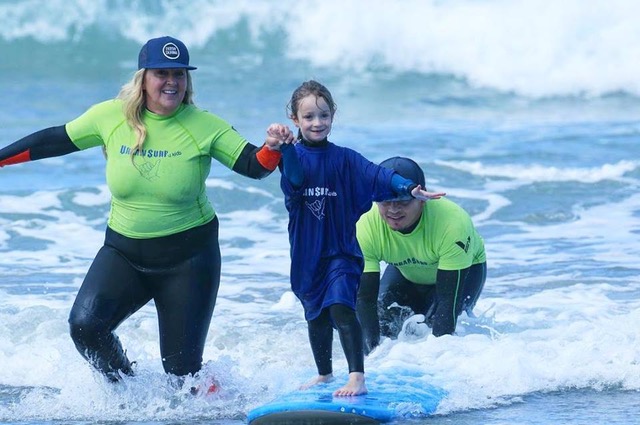
Bridget* (age 10) – Bridget has been in and out of the foster care system since she was two. She has also faced severe neglect and substance abuse. She knows almost no stability and still has a hard time grasping the concept of a family unit. For the first 3 years of her placement in our home, she genuinely believed that she had numerous mommies and daddies because of how many homes she had been in. She often gets made fun of because of this, and it has to lead her to develop a lot of anger towards kids who talk of growing up in a healthy home with their birth parents. She has a really hard time coming to terms with the fact that other kids were born into loving homes and gets to stay with their birth parents but she doesn’t. This has been where Urban Surf has been the most influential in her life. She struggles a lot with not feeling accepted or worthy of others’ love, so having such a large Ohana that she can turn to and find that love has been vital in her healing process. It has also been so important for her to talk to other kids around her age who have also been taken from their birth parents because it helps her to see that she is not alone. Additionally, the ocean has been such a large in her coping skills. She has been taught many coping skills by therapists, but none of them work as consistently as the ocean. In her words, feeling the power of the waves followed by the serene feeling you get while floating has helped her navigate her own overpowering feelings.
(*names have been changed to respect the children’s privacy.)”
When Serena, Christopher, and Bridget (the 3 children mentioned) came to Urban Surf 4 Kids, they all came from different foster care situations that were difficult, and abusive in nature. How have Urban Surf 4 Kids helped them attain their own identities and engage with others in society, make friends? Would you recommend Urban Surf 4 Kids to all or any children in foster care with a difficult background?
“Serena and Christopher have spent most of their lives trying to fit in with children from “normal” backgrounds. They have become accustomed to hiding the parts of themselves that other children wouldn’t understand. In doing so, they hinder their healing process. They were used to playing roles when out in society instead of being themselves because they didn’t feel like they would be accepted. Urban Surf has provided a place where they can be completely themselves. The organization and people within it have shown them that there is nothing wrong with them or their background and that despite everything they have gone through, they can go on to have bright, happy futures. Because they have a place where they don’t have to hide, they have been able to slowly learn who they are behind the masks. And while I stress that this is a slow process, it has made impacts on all parts of their lives. Chris has become less focused on being the super outgoing, class clown who in actuality has very few close friends, and has focused more on learning to trust others and make deeper connections. Serena, alternately, actually has a group of friends now, rather than one friend that she silently follows around. She also has slowly learned how to stick up for herself, rather than hiding behind a complicated mask. Additionally, after feeling like she could freely talk about her past with peers, Serena has been a lot more open during the times she is struggling and allowed us to help her through them.
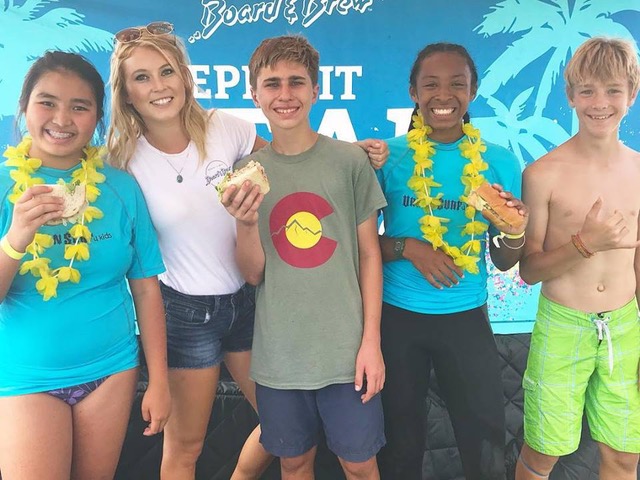
Bridget, on the other hand, has never really tried to hide her background. Rather, before Urban Surf, she would tend to use her past as a way of pushing people away. It wasn’t until she found kids from a similar background who weren’t intimidated by her past that she learned that there was more to her than a troubled background. From there, she has been able to grow into a more well-rounded kid.
I would definitely recommend Urban Surf to all foster children, as well as at-risk youth. While each child’s story is different, there are many underlying themes (a sense of isolation, depression, loss of self, trauma, neglect, etc.) that these children face that the volunteers and the friends they make at US4K understand. However, it’s not just a matter of meeting people from similar backgrounds, but a matter of creating fun, lasting memories with people who understand their struggles and can help them become the best versions of themselves. There isn’t a part of themselves they have to hide because they will be accepted, loved, and encouraged no matter what they went through and how and what they may have had to do to survive.”
Fostering Serena, Christopher, and Bridget, what made you think of turning to Urban Surf 4 Kids? What was the turning point that made you realize you needed the assistance of the program, or that it would be a good idea? What specific characteristics of the program or of the emotional and family needs that would be better met at the program made you consider it?
“I first turned to Urban Surf when we were placed with Christopher and his three younger sisters. Chris is a very athletic kid who had never been able to participate or really learn a sport because of how often he moved, and the lack of support he faced. Being an organization that specifically catered to foster children, we thought Urban Surf would be a safe, judgment-free place to learn how to surf. Additionally, we had heard of how to surf therapy had helped people navigate through their trauma, and while we were eager to try anything, after being given so many coping mechanisms for the kids and seeing so many fails, we were skeptical. However, not only has surf therapy been so helpful in allowing the kids to navigate through their trauma, but Urban Surf has also given us something we didn’t even realize we were desperately searching for: a sense of belonging. We had become so accustomed to the isolation that we couldn’t even fathom finding a place so accepting and loving towards our entire family. I think it is really important for every foster child and foster family to know that there is a place they can go to feel love and acceptance and that they don’t have to live in isolation, or in a place where people really just understand what we do. I wish it hadn’t taken us eleven years of fostering to figure this out.”
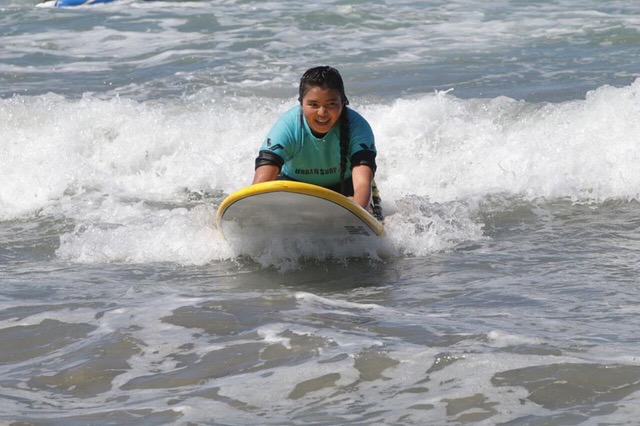
Was there a time when you thought maybe the program wouldn’t work, and you had
to keep trying before you gave up? Maybe you thought if you gave the program another chance and tried a few more days, then you would reconsider? Is the recovery immediate within the program as you’ve observed or did it take some time for them to adjust?
“The majority of our kids fell in love with Urban Surf almost immediately and have never stopped loving it since. However, our adopted son *Brandon had the most difficult time adjusting to the program. Brandon deals with bipolar disorder and is on the spectrum for autism, and as a result, he has a harder time connecting with others. He was also much less willing to go into the water. That’s why having volleyball and sandcastle building and volunteers who only volunteer on land is a wonderful element. On the Dreaming of Aloha trip, he was also able to feel the full extent of the love, acceptance, and fun that Urban Surf has to offer. He was able to connect with another boy from a similar background. Overall the program has provided him so many mentors, friends, and good memories that he otherwise would have never had.”
Do the friends that Serena Christopher & Bridget have made at the program seem to understand their struggles, in more ways than one, in a way that is unique to them as foster youth, or is there a diversity behind youth who had attended the program who all had different stories to tell?
“Every foster child’s story is different and each of their struggles is very unique, however, they are some similarities within them that children from “normal” backgrounds don’t face and therefore cannot relate to. For example, I imagine there aren’t many foster children who specifically grew up in Vietnam and came to the US at age 7 only to be sexually abused by their father (Serena’s story), however, there are many foster children that have been sexually abused by parental or authority figures in their lives. Having friends that understand what it was like to go through this helped Serena tremendously to know that she wasn’t alone, and very importantly, that it wasn’t her fault. Before Urban Surf, we did our best to make sure she knew these things, but to see people she really admired and looked up to talk about having these similar experiences made all the difference. The same goes for Christopher and Bridget; while there may not be kids with their exact story, there are many children and volunteers there who have faced severe neglect and substance abuse and witness domestic violence. Because of this, Chris and Bridget can connect with them on a level they were never able to do with others.
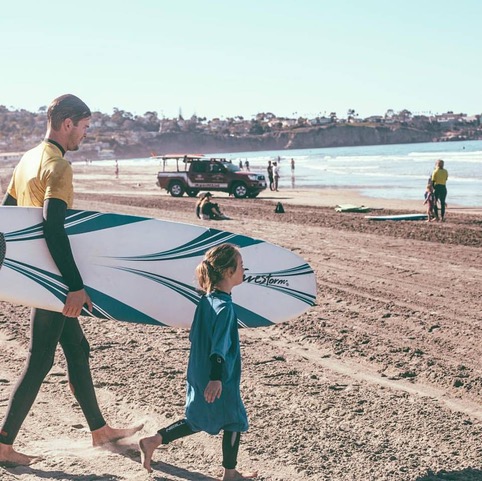
If Serena, Christopher, & Bridget, could each individually sum up their experiences and give one message to foster youth going through similar struggles, what would most likely be their message to those who intensely need a sign or message of hope and faith that things will get better? About their previous struggles or their healing at Urban Surf?
Serena: Before Urban Surf I felt completely alone. While I was surrounded by a family who tried to help and support me, I felt like I couldn’t really talk to people about what my dad did because they wouldn’t understand. However, joining Urban Surf has completely changed that. Urban Surf has been more than a family to me. They are an Ohana. My Ohana. A group of people I can connect with and who never fail to make me feel happy. If I had to give another foster child words of encouragement, I would tell them that, despite how isolated they may be feeling, they aren’t alone; it is possible to find people you can connect with and who understand at least part of what you are going through.
Christopher: Urban Surf has been a second family to me. Through their support and surf therapy, they have helped me feel more free, strong, and confident than anything I have ever partaken in. My words of encouragement for other foster youth would be to look for a way to relieve stress healthily. While there may be more tempting ways of stress relief, nothing has made me feel freer and at peace than surfing with my second family.
Bridget: Urban Surf is a place where you can feel happy and safe, surrounded by people who love you. It was hard for me to let people love me before I went to Urban Surf because I always thought they were going to leave like all the parents I had had before did, but in the past four years, Urban Surf has made me feel more loved and wanted than I ever have before. If I had to tell other foster kids one thing, it would be that they are loved and wanted to.”
ManualMagazines.com
© 2022 Created with Royal Elementor Addons
error: Content is protected !!
This website uses cookies to provide you with the best browsing experience.
Accept
Decline
